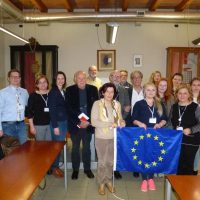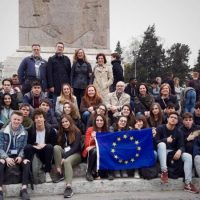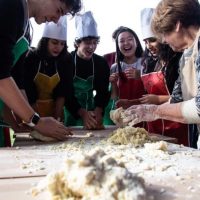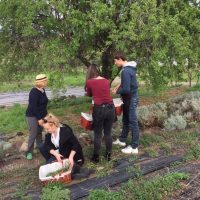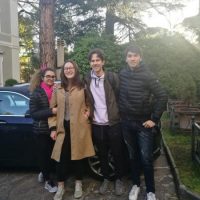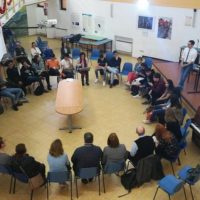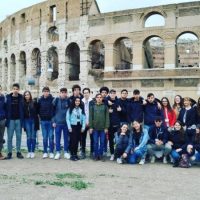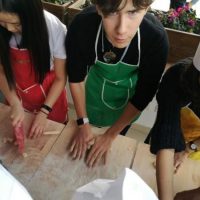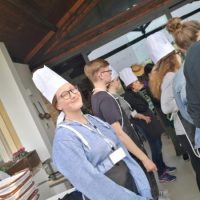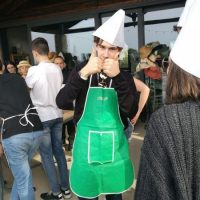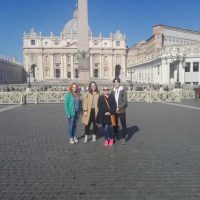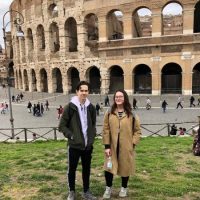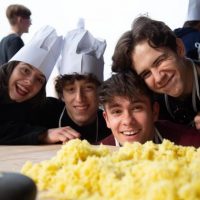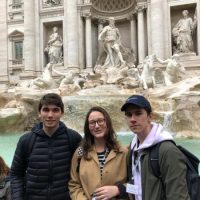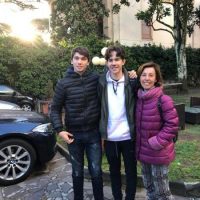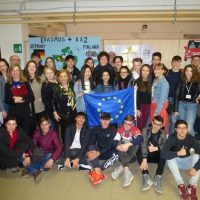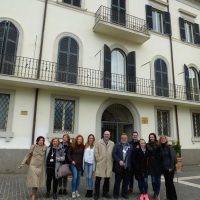April 1ST proved to be kind to the students of ZSS Splot, and the teacher Mrs Urszula Kulig and the Headmaster – Mgr Edyta Danielska. The beginning of a five-day work on the Erasmus + project in Italy sweetened by the weather, delicious food, the atmosphere of the streets of the Eternal City and dynamics of meetings with newly met students, teachers and headmasters from European institutions. After the first day spent kind of lazily visiting the charming Frascati and acclimatizing in Italian families, another turned out to be amazingly intense and full of hard work. Students from Finland, Italy, Croatia, Spain, Germany and Poland joined forces, analysing happy and sad stories related to education posted earlier on the project website. They tried to be in the shoes of not only satisfied with the opportunities offered by the school, but also those lamenting to its deficiencies, shortcomings and redrawing. The road to dream education – a five-day theme discussions in Grottaferrata – it appeared to be tedious and demanding, therefore on the third day participants focused on the diversity that it gives: after the visit and lecture in one of Roman technical universities, the time has come to visit the greatest achievement of Italian artists and art lovers – Rome. Walking along the narrow streets, they stomped at unmistakable movement, multidimensionality of this eternally boisterous city. The stops for continuous laughter, happy discussions and building ties between the participants of the trip were in turn: the Trevi Fountain, Piazza Venezia, Piazza del Popolo, Pantheon, Colosseo and many other bright corners, from where energy and climate of this multiculturalism of the city influenced the participants.
To improve the state of education, first of all, we need to focus on what builds education- relations between students themselves, but also between students and teachers. Undoubtedly, a visit to the Erba Regina Country House contributed to that improvement. It was there that ALL participants took care of the dough forming on gnocchi, then on homemade fettuccine. Cooperation and team spirit – these elements added the flavour to the prepared sauces and pasta – specialties beloved by many Italian cuisine. Dyeing hands in white flour was not the final form of struggle for a better tomorrow of education and its core – relations between students and teachers. Participants of Erasmus + in Italy, gathered around the round table, debating and discussing the three most important, in their opinion, characteristics of a school they would like to see from now on. They were: informal possibilities, education, relations between its most important entities and a more friendly environment to learn and develop your own passions.
The fifth day means the end of the trip and walking lazily along the streets of Eternal City. Thank you all, thanks to whom we had the opportunity to get to know and build links with other European school students. We can differ even in terms of language, but the desire to be a source of a change and persistence in this inspiring diversity remains the same.
1 kwietnia okazał się być łaskawy dla uczniów ZS Splot, Pani Urszuli Kulig i Pani Dyrektor – Edyty Danielskiej. Początek pięciodniowej pracy nad projektem Erasmus+ we Włoszech osłodziła nie skora do żartów pogoda, wyśmienite jedzenie, klimat uliczek Wiecznego Miasta oraz dynamika spotkań z nowo poznanymi uczniami, nauczycielami i dyrektorami europejskich placówek. Po pierwszym dniu spędzonym na leniwym zwiedzaniu urokliwego Frascati i zaaklimatyzowaniu się we włoskich rodzinach, kolejny okazał się być niezwykle intensywny i pracowity. Uczniowie z Finlandii, Włoch, Chorwacji, Hiszpanii, NIemiec i Polski połączyli siły, analizując szczęśliwe i smutne historie związane ze szkolnictwem zamieszczone wcześniej na stronie projektu. Starali się wejść w skórę nie tylko zadowolonych z możliwości, jakie daje szkoła, ale i tych żalących się na jej braki, niedociągnięcia i przerysowania. Droga do wymarzonej edukacji – temat pięciodniowych dyskusji w Grottaferrata – jawi się jako żmudna i wymagająca, dlatego w trzecim dniu uczestnicy skupili się na różnorodności, jakie ona daje: po wizycie i wykładzie w jednym z rzymskich uniwersytetów technicznych, przyszedł czas na zwiedzanie dzieła włoskich artystów i miłośników sztuki – Rzym. Krocząc wąskimi uliczkami, na każdym kroku przebijała zmiana, ruch, wielowymiarowość tego wiecznie hucznego miasta. Przystankami w ciągłym śmiechu, wesołych dyskusjach i budowaniu więzi między uczestnikami wycieczki były kolejno: Fontanna di Trevi, Piazza Venezia, Piazza del Popolo, Pantheon, Colosseo i wiele innych jasnych zaułków, skąd oddziaływała na uczestników energia, klimat i wielokulturowość miasta.
Aby poprawiać stan edukacji, trzeba przede wszystkim skupić się na tym, co tę edukację buduje – relacjach między samymi uczniami, ale i też między uczniami i nauczycielami. Niewątpliwie, wizyta w Erba Regina Country House przyczyniła się do ich poprawy. To tam wszyscy uczestnicy zajęli się własnoręcznym formowaniem ciasta to na gnocchi, to na domowe fettuccine. Współpraca i duch zespołu – te elementy dodały smaku przyrządzanym sosom i makaronom – specjałom uwielbianej przez wielu włoskiej kuchni. Barwienie rąk w białej mące nie było jednak ostateczną formą walki o lepsze jutro edukacji i jej trzonu – relacji między uczniami i nauczycielami. Uczestnicy Erasmus+ we Włoszech, zgromadzeni przy okrągłym stole, debatowali i dyskutowali o trzech najważniejszych, ich zdaniem, cechach szkoły, której mury pragnęliby ujrzeć od już, zaraz. Były nimi: możliwości nieformalnej edukacji, relacje między jej najważniejszymi podmiotami oraz bardziej przyjazne środowisko do nauki i rozwijania własnych pasji.
Piąty dzień oznacza koniec wyjazdu i kroczenia leniwym krokiem po uliczkach Wiecznego Miasta. Dziękujemy wszystkim, dzięki którym mieliśmy możliwość poznania i zbudowania więzi z innymi uczniami szkół europejskich. Możemy różnić się choćby pod względem językowym, ale chęć bycia źródłem zmiany i trwania w tej inspirującej różnorodności pozostaje taka sama.
By Natalia Mroczek

